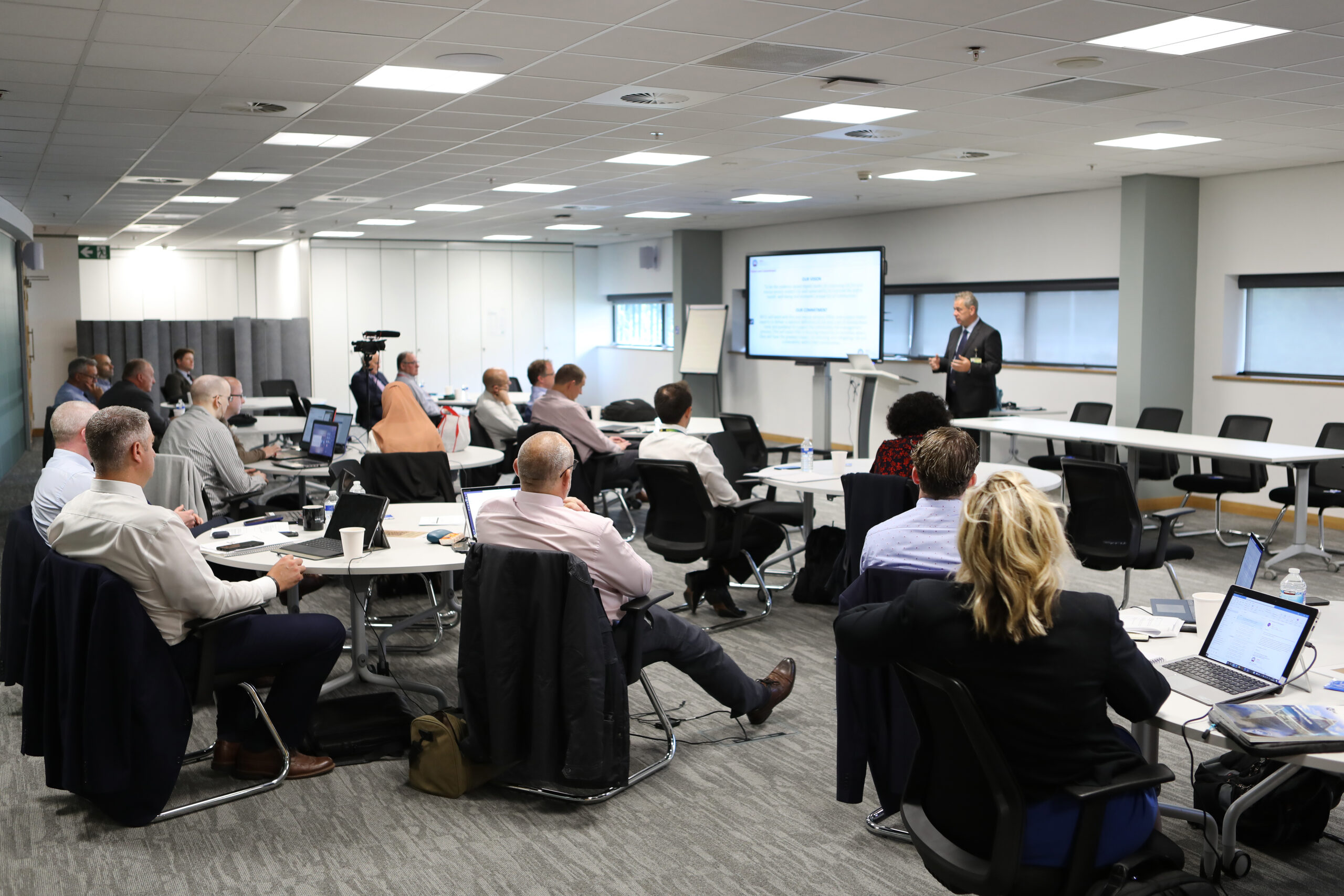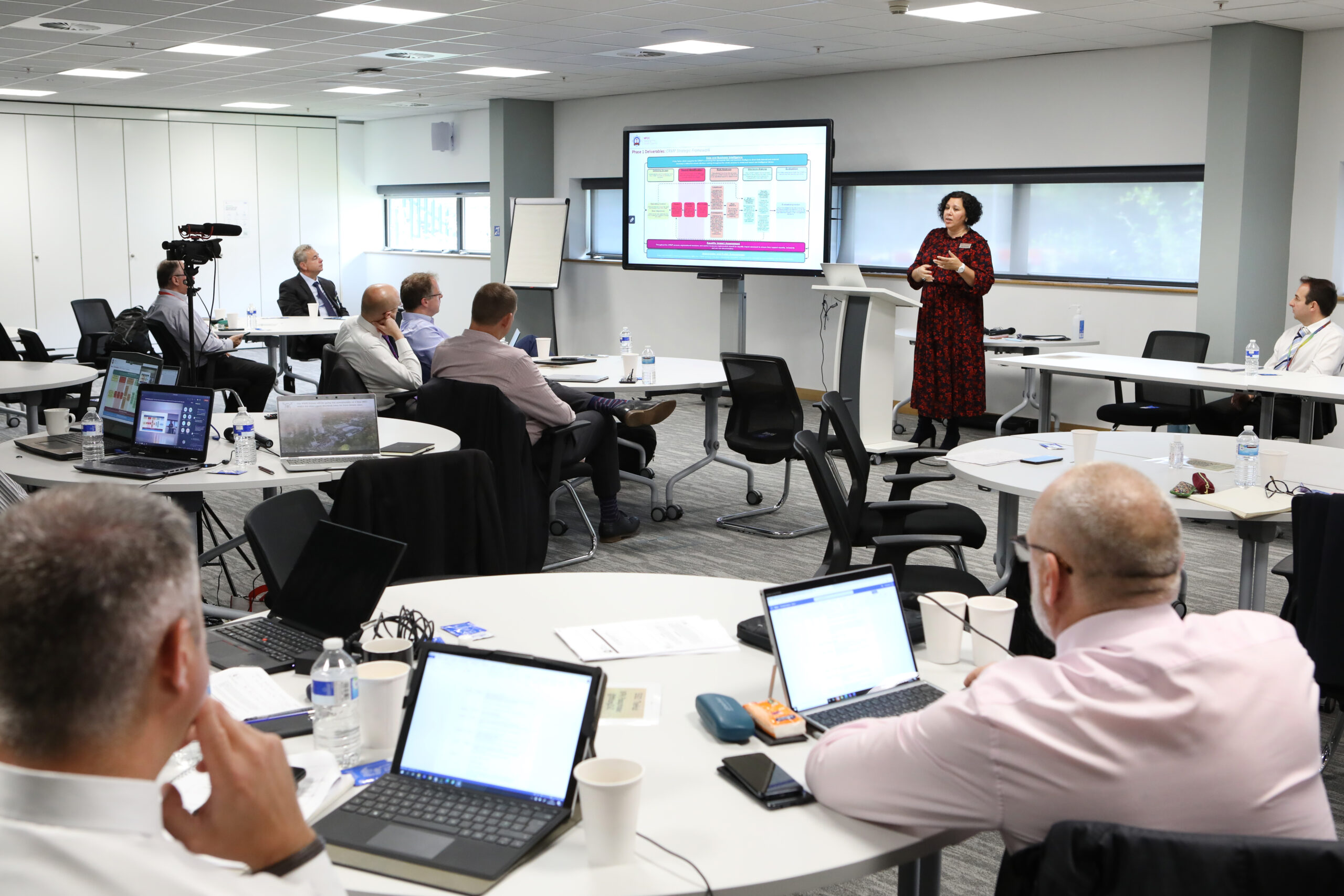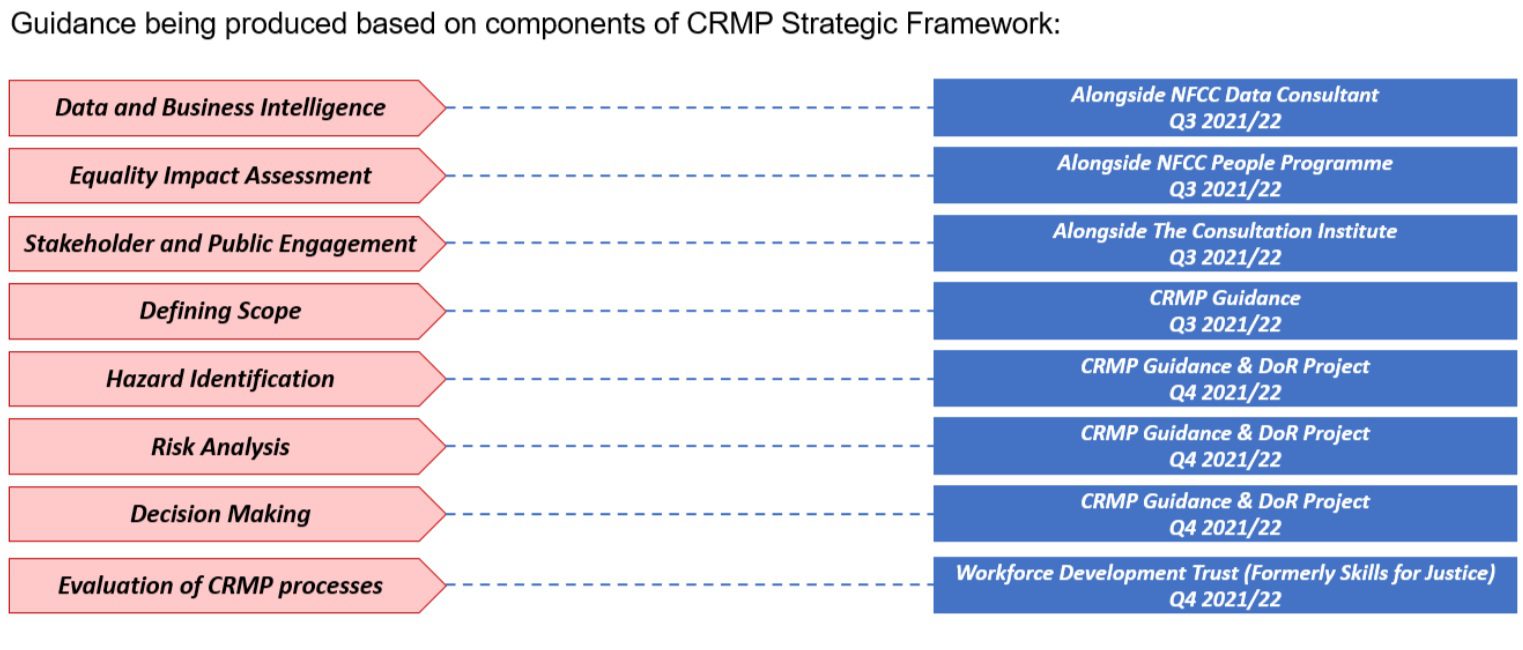CRP Quarterly Briefing – Issue 09
November 2021
Welcome to the CRP Quarterly Briefing, in this issue we look at our successes over the last year and look ahead to 2022.
Programme update

Image: Phil Loach opens the CRP Roundtable in September 2021.
The programme hosted its first Roundtable session with wider sector stakeholders on Thursday 23 September 2021 in the West Midlands. Previously, CRP roadshows planned in spring 2020 were halted due to the COVID-19 pandemic. Since then, the CRP has been engaging with stakeholders via written updates and briefings, online meetings, live webinars, consultations and surveys. Whilst stakeholders can share their thoughts and comments with the team digitally, this was the first time sector colleagues were able to come together with the programme team to hear from the programme executive and each of the CRP’s five project teams in person.
The purpose of the session was to provide a platform for open dialogue and debate to help build a shared understanding of the work of the CRP, its products and perceived benefits.
The iterative nature of the programme’s products was discussed at the Roundtable, this approach will ensure products remain fit for purpose and are responsive to changing risk, new data availability and other factors. Delegates also learned that there is disparity in data acquisition for fire and rescue services across the UK, this currently poses limitations for some services in the identification and analysis of risk in their areas. We believe this can only be resolved collectively within the sector.
Working with UK fire and rescue services and sector stakeholders is key to the successful development and implementation of products, this includes being connected with other work streams where relationships exist with the CRP. It was great to see many of these colleagues at the CRP Roundtable.
The programme hopes to hold a similar event next year, where CRP products will be the subject of discussion with attendees.
The CRP Technical Working Group (TWG)
The TWG provide expert technical advice and support to the programme and its projects around the approaches and application of risk management planning undertaken within fire and rescue services. Established early in the programme, this invaluable group of fire and rescue service practitioners have a working knowledge and understanding of the development, approach, application and/or oversight of risk management planning undertaken by fire and rescue services.
TWG members also support, review and test CRP work and provide professional analysis and feedback to the programme and its projects, adding an extra layer of quality assurance to this important work.
Each member of the TWG is a volunteer. To find out more about the role of the TWG and a list of members, click here.
Project Updates
Community Risk Management Planning Guidance
Project executive: Nikki Richards, Deputy Chief Executive, Royal Berkshire Fire and Rescue Service.
Project manager: Kevin Eaves, NFCC Central Programme Office.

Image: Nikki Richards and Kevin Eaves address attendees at the CRP Roundtable.
This project delivered a strategic framework for the development of CRMPs based on the work of phase 1 of the Definition of Risk project. The tools being developed by the CRP will support each of the components in that strategic framework.
The CRMP Guidance project also produced the CRMP Fire Standard with the Fire Standards Board in consultation with UK fire and rescue services and wider sector stakeholders. The project is now in the process of finalising key guidance pieces that will sit behind the strategic framework and support services in achieving the CRMP Fire Standard. An indicative timeline of delivery for the guidance is set out below:

Definition of Risk
Project executive: CFO Ian Hayton, Cleveland Fire Brigade.
Project manager: Hala Almousawi, NFCC Central Programme Office.
Phase 1 of this project delivered a national definition of risk, glossary of risk related terms and risk conceptualisation framework. The completion of phase 1 then gave rise to phase 2 of the project – the practical and application-based element of this work. Working with ORH the project has now delivered a draft national risk methodology proof of concept report which includes: findings, risk methodology (risk metric) and worked examples of how the methodology should be applied – including data sets used.
The Developing a National Risk Methodology Proof of Concept report covers dwelling fires and, in October, received approval from the CRP Programme Board to proceed to consultation. The consultation went live on Monday 8 November for UK Fire and rescue services. Feedback from the consultation will help to further refine the report and will be available for fire and rescue services to utilise in March 2022, subject to approval of the NFCC Steering Group. The next step in this work involves applying the methodology to other incident types.
This report marks a significant step in understanding and mitigating community risk and towards bringing national consistency in this important area of fire and rescue work.
Economic and Social Value of the UK Fire and Rescue Service
Project executive: Dan Quinn, Assistant Chief Fire Officer, Shropshire Fire and Rescue Service.
Project manager: Paul Cohen, NFCC Central Programme Office.
Phase 2 of this project set out to develop an econometric model for calculating economic and social value for fire and rescue service activities. The full report details the methods used to calculate the value of all included activities, preliminary results across those activities, and a copy of the Excel spreadsheet used to make the calculations.
The draft report will be presented to the CRP Board before the end of the year, followed by NFCC Steering Group and NFCC full Council for discussion early next year.
As this phase nears completion, the team will begin the procurement process for phase 3. Phase 3 will focus on the creation of an app or online tool, allowing fire and rescue services to calculate the economic and social value of their activities.
Competencies
Project Executive: Gavin Ellis, Assistant Chief Fire Officer, Devon and Somerset Fire and Rescue Service
Project manager: Kevin Eaves, NFCC Central Programme Office.
This project is still in the initiation stage and a Project Board has been assembled.
Though much of this work is yet to be explored and understood, the project is clear that a single individual in a fire and rescue service will not be expected to demonstrate all the competencies that will be identified. It will be acceptable for a fire and rescue service to demonstrate the competencies required to produce a CRMP by a team of individuals. It may even be a possibility for a fire and rescue service to externally source an organisation – including another fire and rescue service – with the required competencies to support the development of the CRMP.
The project will look to deliver competency frameworks to help fire and rescue services to ensure they have access to the right skills and abilities to enable them to conduct an effective CRMP process. Competencies will be based on the components of the CRMP Strategic Framework.
Evaluation of Fire Service Interventions
Project Executive: Niall Mckiniry, Assistant Chief Fire Officer, Humberside Fire and Rescue Service
The National Review of community risk methodology across the UK FRS conducted by the Nottingham Trent University in 2018 found there was little evidence of evaluation taking place in fire and rescue services. Being able to describe the effectiveness of interventions to reduce risk is critical in a risk management plan and having a robust evaluation method is part of the process. These findings gave rise to this project, which is currently in its initiation stage.
The need for effective evaluation was also highlighted in the HMICFRS’s State of Fire and Rescue Report 2019.
Without a robust evaluation method, it is not possible for fire and rescue services to determine if their intervention activities are having the expected impact, however, there is currently no guidance available to support services in this area. This project aims to address this gap.
One of the early activities at the project initiation stage will include conducting a stakeholder analysis and a dependencies mapping exercise to identify any areas of work that this project should be engaging with. If you feel this project should be engaging with an area of work you are aware of, please get in touch with us by emailing: communityriskprogramme@nationalfirechiefs.org.uk
For general questions and comments about the programme or if you would like to get involved in our work, please email the Programme Team: CommunityRiskProgramme@nationalfirechiefs.org.uk
Paul Cohen is the interim programme manager for the CRP, if you would like to contact Paul, please email: Paul.Cohen@nationalfirechiefs.org.uk
To subscribe to the CRP quarterly briefing, please email: CommunityRiskProgramme@nationalfirechiefs.org.uk
